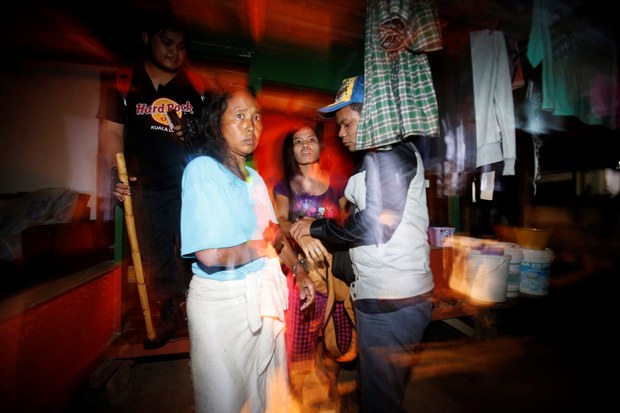After abuse report, Indonesia seeks speedy deportation of workers detained in Malaysia
2022.06.30
Jakarta
 Immigration enforcement officers detain suspected illegal migrant workers (second from left, second from right) from Indonesia during a crackdown on illegal migrant workers in Nilai, outside Kuala Lumpur, Sept. 1, 2013.
Immigration enforcement officers detain suspected illegal migrant workers (second from left, second from right) from Indonesia during a crackdown on illegal migrant workers in Nilai, outside Kuala Lumpur, Sept. 1, 2013.
Jakarta has urged Kuala Lumpur to speedily deport illegal Indonesian immigrants rather than detain them, after an NGO group claimed that hellish detention conditions led to 25 deaths in the eastern state of Sabah in the last 18 months.
The group’s report, based on interviews with deported Indonesians, shines a light on Malaysia’s secretive immigration depots, which house an unknown number of people in the country whose economy is a draw for and dependent on foreign labor.
The spokesman for Indonesia’s Ministry of Foreign Affairs, Teuku Faizasyah, told BenarNews that 18 migrant workers died last year and another seven died this year at Sabah immigration depots.
“The main cause of the high number of deaths was delays in the repatriation of deportees due to travel restrictions during the pandemic,” the ministry said in a statement.
At a meeting with Malaysian authorities this week, the Indonesian government “requested that repatriation be carried out immediately” while risks of COVID-19 are low, the statement said, adding that officials also called on authorities to improve health care and sanitation at the detention centers.
Interviews with deported Indonesian workers released last week by the Makassar-based Coalition of Sovereign Migrant Workers (KBMB) found a pattern of mistreatment, neglect and violence at the detention centers, said Abu Mufakir, head of the coalition.
The detainees were “treated very badly there – the food was bad, the sleep quality was bad. If they were sick they were not treated,” he said.
A woman who spent 14 months at a detention center in Tawau, Sabah was quoted as saying in the KBMB report: “What I never experienced outside, I endured all in the detention. Maybe it is what we call hell on earth.”
She added: “All kinds of misery were there. Sometimes there was no water for several days. We had difficulty bathing, drinking and sleeping. When we complained of being sick, we were scolded at times.”
KBMB said in its report that Malaysia had deported nearly 2,200 undocumented Indonesian workers between March 2021 and June this year.
Some of those detained were arrested by Malaysian authorities at the border while trying to return to Indonesia.
Malaysia’s Home Affairs Minister Hamzah Zainuddin said the authorities would conduct major operations to ensure that migrant workers were registered and had travel documents from their home countries.
“We can arrest whoever violates the immigration act and when we arrest them, they will be put in detention centers and, do not blame the immigration [department] or the home ministry if anything happens to them,” he said on Thursday.
“They were detained because they had committed an offense and that was the reason why they were put in detention centers.”
Torture
Back in Jakarta, Anis Hidayah, founder of the labor advocacy group Migrant Care, said reports of detainees’ abuse should be taken seriously by the Indonesian government.
“Because what I know from research by Migrant Care and deportees from Malaysia, there have been cases of torture in immigration depots,” Anis told BenarNews.
Phil Robertson, Asia deputy director of Human Rights Watch, said that in Malaysia “migrants are treated no better than animals,” with poor quality food, lack of potable water, poor sanitation.
“So, it’s really no wonder that dozens of detained migrants have gotten seriously ill and died in such barbaric conditions of detention,” he said.
He slammed Home Minister Hamzah’s defense of raids targeting undocumented migrant workers as “outrageous and unacceptable”.
“Zainudin’s failures to treat people with basic decency and dignity is a dark black stain on the international reputation of [Malaysian] PM [Ismail] Sabri [Yaakob]’s government, and should be raised continuously by the international community until improvements in conditions of detention are made,” he said.
KBMB’s report comes two months after six Rohingya refugees were killed, two of them children, as hundreds of the stateless Myanmar minority broke out of a cramped detention center in northern Malaysia in the midst of a riot. The six were killed by vehicles as they tried to cross a highway in the dark.
Back then, Amnesty International Malaysia demanded the government fully and transparently investigate the events “including the desperate circumstances” within the Bakap immigration detention center that led to detainees trying to escape.
Malaysia’s Human Rights Commission Suhakam should investigate how many temporary immigration detention centers are in existence across the country, Katrina Jorene Maliamauv, executive director of Amnesty International Malaysia, said in a statement.
“Conditions at these immigration detention centers should be documented, given past incidences of human rights violations in immigration depots in Malaysia,” she had said. She called indefinite detention “traumatizing.”
Indonesian labor activists and officials have also criticized as unjust a decision this month by Malaysia’s Federal Court to acquit and discharge a housewife accused of murdering her Indonesian maid four years ago.
In April, Indonesia and Malaysia signed an agreement to provide greater protection to migrant workers in Malaysia, where about 3.1 million Indonesians work, mainly as labourers.
Muzliza Mustafa in Kuala Lumpur contributed to this report.







